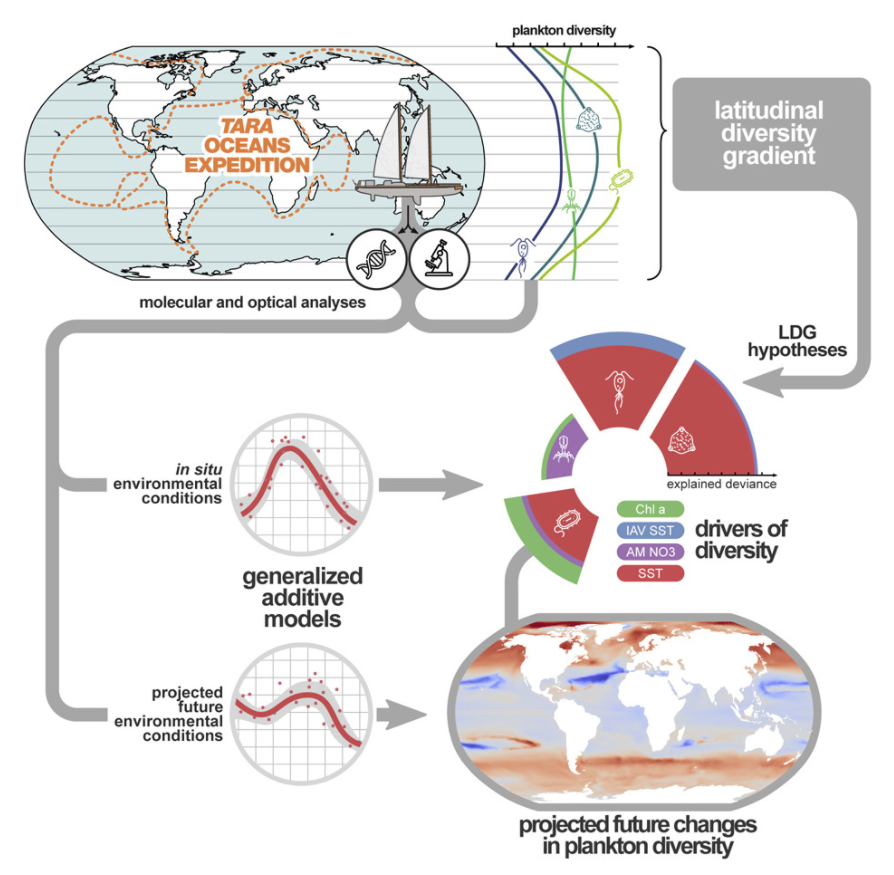BDB-Lab members involved
Global Trends in Marine Plankton Diversity across Kingdoms of Life

Global Trends in Marine Plankton Diversity across Kingdoms of Life
by Federico M. Ibarbalz, Nicolas Henry, Manoela C. Brandao, Severine Martini, Greta Busseni, Hannah Byrne, Luis Pedro Coelho, Hisashi Endo, Josep M. Gasol, Ann C. Gregory, Frederic Mahe, Janaina Rigonato, Marta Royo-Llonch, Guillem Salazar, Isabel Sanz-Saez, Eleonora Scalco, Dodji Soviadan, Ahmed A. Zayed, Adriana Zingone, Karine Labadie, Joannie Ferland, Claudie Marec, Stefanie Kandels, Marc Picheral, Celine Dimier, Julie Poulain, Sergey Pisarev, Margaux Carmichael, Stephane Pesant, Marcel Babin, Emmanuel Boss, Daniele Iudicone, Olivier Jaillon, Silvia G. Acinas, Hiroyuki Ogata, Eric Pelletier, Lars Stemmann, Matthew B. Sullivan, Shinichi Sunagawa, Laurent Bopp, Colomban de Vargas, Lee Karp-Boss, Patrick Wincker, Fabien Lombard, Chris Bowler, Lucie Zinger, Silvia G. Acinas, Marcel Babin, Peer Bork, Emmanuel Boss, Chris Bowler, Guy Cochrane, Colomban de Vargas, Mick Follows, Gabriel Gorsky, Nigel Grimsley, Lionel Guidi, Pascal Hingamp, Daniele Iudicone, Olivier Jaillon, Stefanie Kandels, Lee Karp-Boss, Eric Karsenti, Fabrice Not, Hiroyuki Ogata, Stephane Pesant, Nicole Poulton, Jeroen Raes, Christian Sardet, Sabrina Speich, Lars Stemmann, Matthew B. Sullivan, Shinichi Sunagawa, Patrick Wincker
Abstract
The ocean is home to myriad small planktonic organisms that underpin the functioning of marine ecosystems. However, their spatial patterns of diversity and the underlying drivers remain poorly known, precluding projections of their responses to global changes. Here we investigate the latitudinal gradients and global predictors of plankton diversity across archaea, bacteria, eukaryotes, and major virus clades using both molecular and imaging data from Tara Oceans. We show a decline of diversity for most planktonic groups toward the poles, mainly driven by decreasing ocean temperatures. Projections into the future suggest that severe warming of the surface ocean by the end of the 21st century could lead to tropicalization of the diversity of most planktonic groups in temperate and polar regions. These changes may have multiple consequences for marine ecosystem functioning and services and are expected to be particularly significant in key areas for carbon sequestration, fisheries, and marine conservation.
Full text: https://doi.org/10.1016/j.cell.2019.10.008
Copyright (c) 2018–2024. Luis Pedro Coelho and other group members. All rights reserved.
